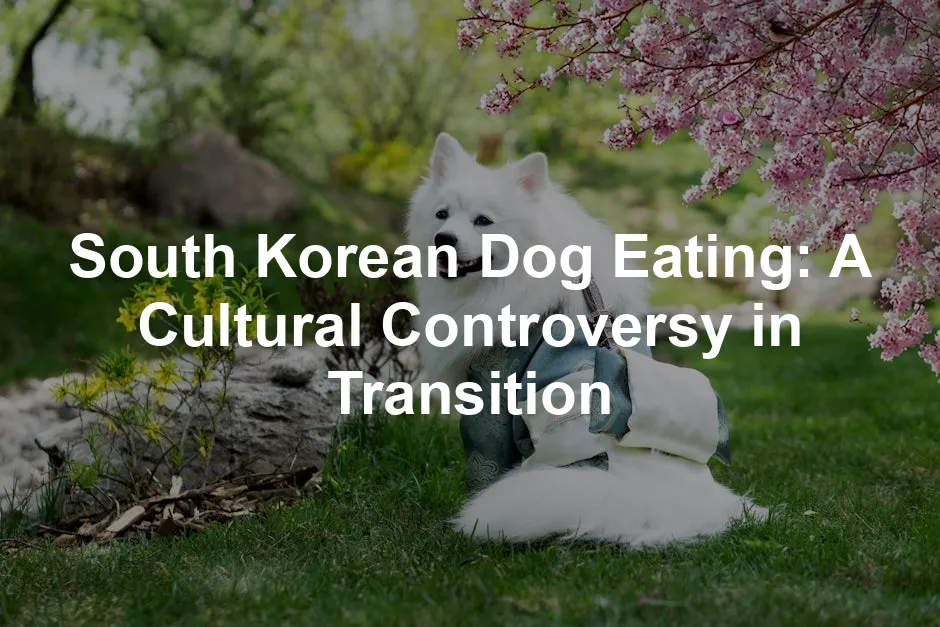Introduction
Dog meat consumption in South Korea has a complex history. Once a common practice, it now faces significant scrutiny. Recent legislative changes have sparked discussions about its future in society. As cultural values shift, the debate continues to intensify.
While we ponder this controversial topic, why not ensure your furry friend is well taken care of? Check out this Dog Training Book to help you navigate the ins and outs of dog behavior—because what better way to bond with your pet than through training?

Summary and Overview
Historically, dog meat consumption dates back to ancient Korea. It was once viewed as a source of strength and vitality. However, attitudes have shifted dramatically, especially among younger generations. Recent laws banning the dog meat trade signal a major change. A 2020 survey revealed that 83.8% of South Koreans have never consumed dog meat. Public opinion is increasingly leaning towards animal rights, with many supporting a complete ban.
If you’re a dog owner, the transition to more humane practices can start at home. Equip yourself with a Pet First Aid Kit. Accidents happen, and being prepared can make all the difference in an emergency!

Historical Context of Dog Meat Consumption
The Roots of Dog Eating in Korea
The practice of consuming dog meat has roots in Korea’s Neolithic period, around 6000-2000 BCE. During the Silla and Goryeo dynasties, Buddhist influences promoted vegetarianism. Yet, in the Joseon Dynasty, dog meat became a delicacy, often reserved for special occasions. Traditional beliefs held that dog meat could provide health benefits. It was believed to boost stamina, especially during hot summer months. The versatility of dog meat led to the creation of various dishes, enhancing its cultural significance.
As societal norms evolve, the future of dog meat consumption remains uncertain. The historical context is essential to understanding the ongoing debates surrounding this practice.
The Evolution of Consumption Habits
Dog meat in South Korea has a long and complex history. It became a common protein source during times of scarcity. In the past, dog meat was praised for its supposed health benefits. Many believed it provided energy and stamina, especially during hot summer months.
Before the 1988 Seoul Olympics, dog meat consumption was widespread. The Olympics brought international attention, leading to criticism of this practice. As a result, many South Koreans felt ashamed of the tradition. This event marked a pivotal shift in public perception.
Historically, consumption levels were significant. In 2002, around three million dogs were slaughtered annually for meat. By the early 2020s, this number significantly decreased to under one million. Surveys indicated that today, many South Koreans have distanced themselves from this practice.

Legislative Changes and Their Impact
Recent Laws and Bans
On January 9, 2024, South Korea passed a groundbreaking law. This legislation bans the production and sale of dog meat, effective in 2027. The government has provided a three-year transition period for farmers. Violators of this law could face severe penalties, including fines or imprisonment.
Animal rights organizations played a crucial role in advocating for this ban. Their efforts reflect changing attitudes towards animal welfare. The law signals a significant cultural shift in South Korea. Want to help your dog feel special and loved? Consider investing in a Dog Leash and Collar Set that makes walks more enjoyable!

The Future of Dog Meat Consumption
The new law will impact dog meat restaurants and farmers across the country. Many establishments will be forced to close or adapt their businesses. This shift may lead to a decline in dog meat consumption overall.
Public perception is also likely to change. With increased awareness of animal rights, younger generations are less inclined to consume dog meat. Recent surveys reveal strong support for the ban. Approximately 57% of South Koreans favor ending the dog meat trade.
The landscape of dog meat consumption is transforming. As society evolves, the future of this practice remains uncertain. To ensure your dog has a cozy place to rest, check out this amazing Dog Bed that will have them snoozing in no time!

Current Landscape of Dog Meat Consumption
Demographics of Dog Meat Consumers
Today, dog meat consumption in South Korea is primarily associated with older adults. Many consumers are over 50 years old and often reside in rural areas. Younger generations show a growing aversion to this practice. A 2020 survey revealed that 83.8% of South Koreans never consumed dog meat. Interestingly, only 8% of people reported eating dog meat within the past year, indicating a significant decline.
Public attitudes are shifting rapidly. Many younger individuals view dog meat as unacceptable. They prefer to see dogs as companions rather than food. The cultural landscape is changing, as pet ownership continues to rise. One in four South Koreans now owns a pet, showcasing a shift in values. Speaking of pets, if you’re looking for a way to keep them hydrated, consider a Pet Water Fountain that makes drinking fun!

The Dog Meat Industry Today
The dog meat industry has seen drastic reductions in scale. Currently, fewer than 1,200 dog meat farms remain active in South Korea. A report from 2022 noted around 1,600 restaurants serving dog meat, down from thousands a decade ago.
Conditions on dog meat farms are a significant concern. Reports indicate that many dogs are raised in cramped cages, often lacking proper care. Advocates highlight alarming practices, including inhumane slaughter methods. These issues have fueled public outrage and calls for change within the industry. To support your dog’s health and hygiene, consider using a Dog Grooming Kit that keeps your pup looking sharp!

Animal welfare organizations have reported numerous violations, prompting scrutiny of these practices. As society’s views on dogs evolve, the push for better treatment intensifies. The future of the industry appears increasingly uncertain as laws and cultural attitudes shift.
Cultural Perspectives and Controversy
Domestic Reactions
In South Korea, opinions on dog meat consumption are deeply divided. Many younger citizens oppose the practice, viewing it as outdated and cruel. A significant portion of the older generation, however, still supports it, often citing tradition.
Quotes from various perspectives reveal this clash. An animal rights advocate remarked, “Dogs are companions, not food.” In contrast, a dog farmer stated, “This is our culture; we should be free to choose.” Here’s a thought: why not celebrate your furry friend with a fun Dog Costume for those special occasions?

International Criticism and Cultural Sensitivity
Dog meat consumption in South Korea has faced intense scrutiny worldwide. Many foreigners find the practice shocking and often label it as barbaric. This perception creates a cultural clash, especially when discussing dietary choices. International criticism surged during events like the 1988 Seoul Olympics. Foreign media spotlighted the issue, prompting many South Koreans to reconsider their culinary traditions. A growing number felt embarrassed by the practice, leading to significant shifts in public opinion.
Campaigns and petitions have gained momentum, advocating for a complete ban on the dog meat trade. Organizations like Humane Society International have played pivotal roles in this movement. As awareness spreads, more South Koreans support ending the practice. Surveys indicate that around 57% of citizens favor a ban on dog meat consumption. This change reflects a broader cultural shift toward animal rights and welfare. If you’re looking to educate yourself further on animal rights, consider grabbing an Animal Rights Book that dives deep into these important issues.

Ethical Considerations
Animal Rights and Welfare
The ethics of consuming dog meat raises profound questions. Many argue that dogs are companions, not livestock. This perspective is gaining traction, especially among younger generations who view dogs as family members. Animal rights advocates emphasize the need for humane treatment. They argue that using dogs for meat is inherently cruel.
Conversely, proponents of dog meat consumption cite cultural tradition and dietary choice. They believe individuals should have the freedom to decide what to eat. This debate highlights the complexity of animal rights discussions. Both sides present compelling arguments that challenge societal norms and values.

Personal Choices and Cultural Identity
As South Korea modernizes, a conflict emerges between tradition and contemporary values. Older generations often cling to their culinary heritage, while younger people question its relevance. This generational divide complicates personal choices regarding diet. For many, food is intertwined with cultural identity.
In this context, what constitutes acceptable food becomes subjective. Some view dog meat as an integral part of tradition, while others reject it entirely. As societal norms continue to evolve, the discussion surrounding dietary choices remains dynamic. The clash between traditional practices and modern ethics shapes the future of food culture in South Korea. If you’re a pet owner, you might also want to consider a Dog Training Clicker to help with your training efforts!

Conclusion
The practice of dog meat consumption in South Korea is undergoing a significant transformation. Historically, it was a common source of protein, deeply embedded in cultural traditions. However, recent legislative changes signal a shift in societal values. The new law banning the production and sale of dog meat, effective in 2027, reflects changing attitudes towards animal rights. Public opinion, particularly among younger generations, increasingly favors animal welfare.
As we look ahead, the future of dog meat consumption appears uncertain. While some may cling to tradition, the reality is that many South Koreans now view dogs as companions rather than livestock. This shift invites a broader conversation about cultural practices and ethical considerations. And for those who love to travel with their pets, don’t forget to check out a Dog Travel Carrier to make your adventures together easier!

Continuing the dialogue on these topics is crucial. Engaging in discussions about food traditions and animal rights can foster understanding and promote compassion.
FAQs
Is dog meat still consumed in South Korea?
Yes, but consumption is declining sharply. Recent surveys show that around 8% of people have eaten dog meat in the past year, down from 27% in 2015. The majority of South Koreans now oppose this practice.
What are the most common dog meat dishes?
Popular dishes include bosintang (dog meat soup), gaegogi jeongol (dog meat stew), gae suyuk (boiled dog meat), and gaesoju (a drink with dog meat). These dishes are often viewed as traditional and are believed to have health benefits.
Why is dog meat consumption controversial?
The practice raises ethical concerns about animal rights. Many argue that dogs should be companions, not food. Cultural attitudes are shifting, and increasing public opinion supports banning dog meat altogether.
What does the new legislation mean for dog meat farms?
The legislation will prohibit breeding, slaughtering, and selling dogs for meat by 2027. Farmers must transition to alternative livelihoods, and those who violate the law face significant penalties.
How do younger generations view dog meat consumption?
Younger South Koreans increasingly reject dog meat, viewing it as outdated and inhumane. Surveys indicate a strong preference for dogs as pets, reflecting changing cultural norms around companionship and food choices.
Please let us know what you think about our content by leaving a comment down below!
Thank you for reading till here 🙂
The topic of dog meat consumption in South Korea is a significant cultural issue, reflecting deep-rooted traditions and evolving societal values. south korean dog eating
All images from Pexels





